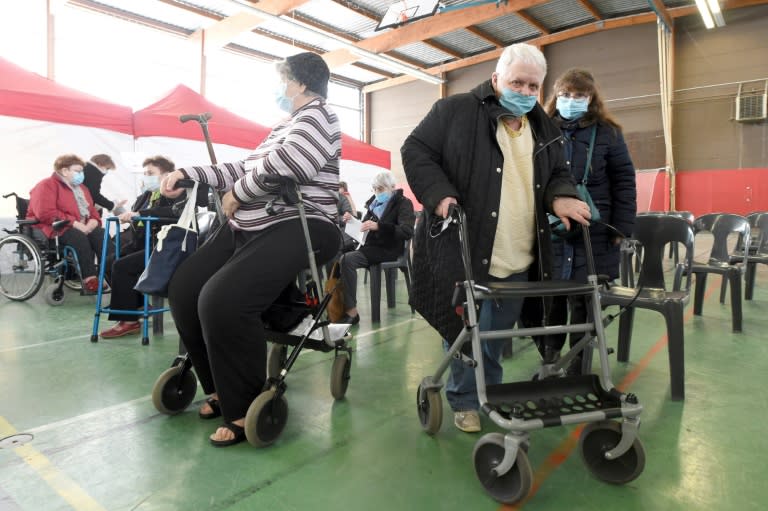In the Covid-19 intensive care unit at Antony Private Hospital, south of Paris, no beds are available for long and doctors wonder when their workload will finally peak.
While a recovered elderly patient is taken out of the ward, smiling faintly, Chief Jean-Pierre Deyme is on the phone, organizing the next arrival and giving instructions to the team.
Louisa Pinto, a nurse with almost 20 years of experience, points to the unoccupied room where a cleaning maid is already working, rubbing the mattress for the next arrival.
“The bed won’t even have time to cool down,” she says, while the patient monitoring system beeps constantly in the background.
For now, everything is stable in the 20 beds around it, where the victims of Covid-19 lie inanimate, in a silent battle against the virus.
Paris is experiencing a third wave of the pandemic, which risks putting even more pressure on saturated hospitals than the first wave in March and April last year.
“With what comes in April, it will be very complicated,” says Pinto, a mother of three who has not taken a vacation since last summer and like other employees, will cancel a planned break this month.
Even with a new round of restrictions taking effect this week, Health Minister Olivier Veran predicts that infections in France will peak only in mid-April, while hospital admissions will continue to rise until the end of the month.
Alarming predictions leaked to the French media from the Paris public hospital authority AP-HP last week showed somewhere between 2,800-4,400 people in intensive care in the Paris region by the end of April, even with a rigid blockade.
In the first wave, the number peaked at 2,700.
– Lack of staff –
The director of the Antony hospital, Denis Chandesris, says that the capacity for intensive care has already been increased with the drastic reduction of all surgeries, except for critical cancer, cardiac and emergency cases.
Hospitals across the region have taken similar measures, relocating beds and creating new wards, but they are reaching their limit.
“The difficulty is not so much the beds or the material, it is a matter of finding medical and paramedical staff to receive the patients,” explained Chandesris.
Last Sunday, a group of emergency care directors in Paris warned in an open letter that the situation was so bad that doctors would soon have to start “screening” – selecting patients for care based on their chances of survival.
That prospect horrifies the team – and President Emmanuel Macron has always promised to protect hospitals and avoid the kind of scenes witnessed in Italy last March, when patients huddled in the corridors.
In a televised speech to the country on Wednesday night, he promised to increase the nationwide intensive care capacity from 7,665 beds today to 10,000 – a jump of 30 percent.
“I want to thank the retired medical students, the army health service and the volunteers in the medical reserve. Everyone will be mobilized more broadly, ”he announced.
Opposition politicians and some experts reacted with skepticism, while an Ifop poll for the weekly Journal du Dimanche revealed that only 35 percent of French people trusted their government “to deal effectively with the coronavirus”.
Nurse Pinto stressed that working in intensive care is “very technical”, requiring training and specialized knowledge.
– New restrictions –
Macron is betting on a limited block over the next month, turning the rising tide of cases that have practically doubled to 40,000 a day compared to a month ago.
The strong acceleration is due to the spread of the so-called British variant, which is more contagious, which became dominant in France.
New measures include restrictions on travel across the country, limiting people to 10 kilometers (six miles) from their homes, and closing non-essential schools and shops.
Just a significant increase in the vaccination campaign – which started slowly but is now gaining momentum – fills any of the doctors at Antony Private Hospital with hope.
After months without doses, the government promises a big launch this month and an increase in the jabbing rate.
Samir Taik, a taxi driver from Paris, left Antony hospital last week as the 1,000th patient in Covid-19 to benefit from oxygen therapy in the Covid-19 intensive care unit.
The 43-year-old man, who likes boxing and sports, is still out of breath and suffering from the trauma of seeing his health deteriorate so quickly.
He says he knows three or four people with a similar profile to him who were recently hospitalized.
“Young people need to know that they are not 80-year-olds, but 30, 40, 45 years old and without health problems. The British variant is not like the old one, ”he said. he told AFP.
adp / sjw / kjl
